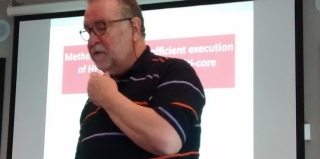Abstract
In parallel applications executed in HPC environments there are idle times during the execution that can be caused by communication collisions or cache conflits generating cache misses.
We are developing a methodology, for message passing parallel scientific applications, which attempts to reduce the applications execution time by reducing these idle times.
In our proposal, to allocate processes to processors, we define two kind of “forces” acting among the processes: attraction and repulsion forces.
In our proposal, to allocate processes to processors, we define two kind of “forces” acting among the processes: attraction and repulsion forces.
- Attraction forces are used to approximate those processes interchaning high volumes of communications, in order to speed up the communication.
- Repulsion forces are used to “separate” those processes with high volumes of data, in order to avoid they can share common caches, generating high cache misses ratios.

